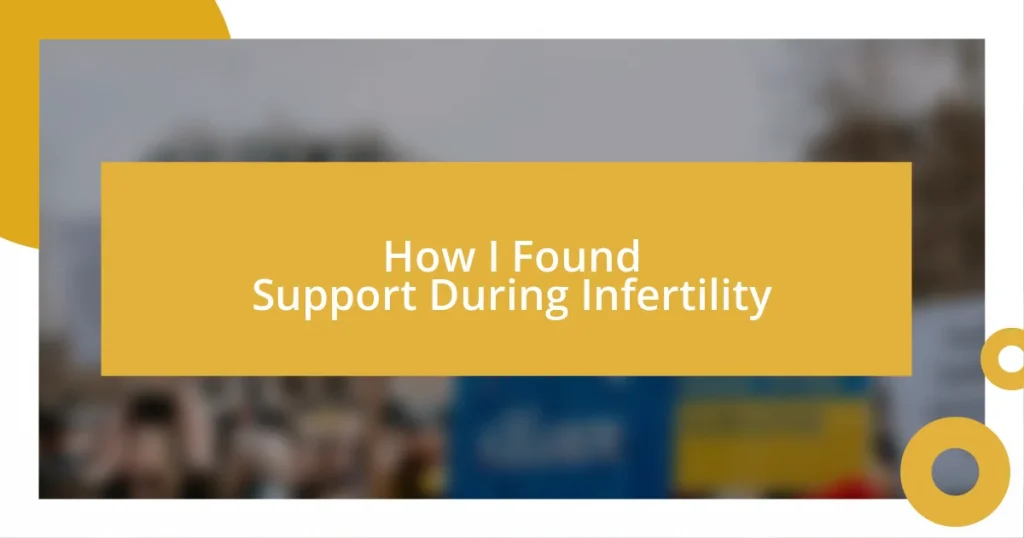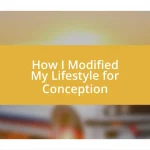Key takeaways:
- Understanding and expressing emotions surrounding infertility is crucial for mental well-being, allowing individuals to navigate their feelings of grief and hope effectively.
- Engaging with online and local support communities provided a sense of belonging and shared experience, enhancing emotional resilience during challenging times.
- Professional counseling and self-care practices, including mindfulness and creative outlets, significantly aided in coping with the emotional complexities of infertility.
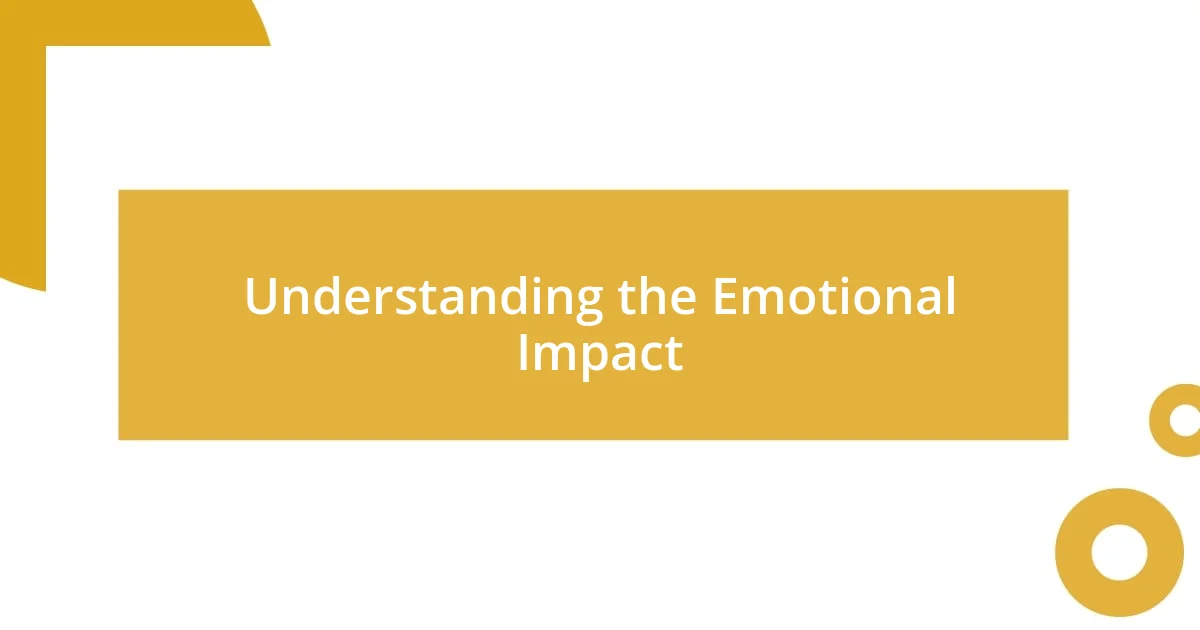
Understanding the Emotional Impact
Infertility can feel like an emotional rollercoaster, one that I often found difficult to navigate. I remember days when I would be inconsolable, overwhelmed by a mix of grief and guilt, wondering, “Why is this happening to me?” It’s a disheartening question that many in similar situations may ask themselves, leaving us to grapple with feelings that are both heavy and isolating.
What surprised me was how often I felt alone, despite having supportive friends and family. I would catch myself pulling away, afraid to voice my fear of never becoming a parent. It’s fascinating how silence can amplify our fears, making the emotional toll even more profound. Have you ever felt that way? That knot in your stomach, the ache of unspoken words? I found that opening up, even in small moments, helped to lighten that burden.
During this journey, I learned that sadness can coexist with hope. It’s perfectly okay to feel joy for others while struggling with your own pain. I vividly recall attending a baby shower, where I felt a whirlwind of emotions wash over me. Instead of pushing those feelings aside, I allowed myself to experience the moment fully, even if it meant shedding tears in private later. It’s all part of understanding the emotional impact of infertility—recognizing that it’s a multifaceted experience that deserves acknowledgment and compassion from ourselves.
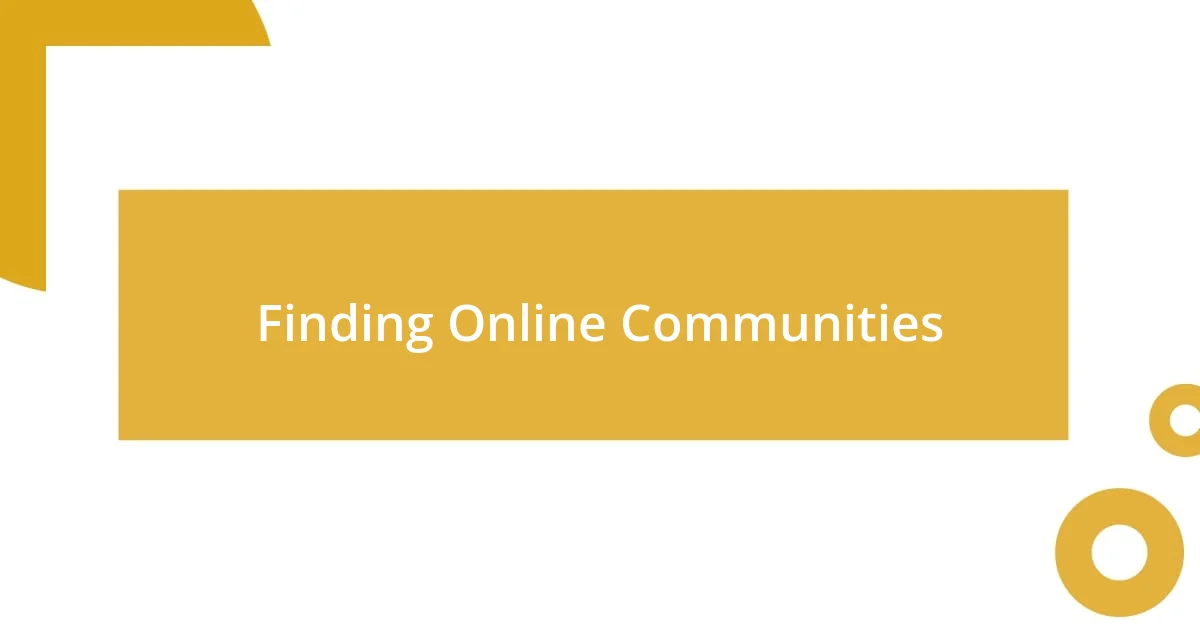
Finding Online Communities
Finding a supportive online community was a game changer for me. I stumbled upon various forums and social media groups where others shared their stories and struggles. It truly felt like a weight lifted when I realized I wasn’t the only one facing these challenges. Engaging with these communities offered a sense of camaraderie that I didn’t expect.
Here are some insights on how to find online communities related to infertility:
- Search social media platforms: I joined groups on Facebook and Instagram, where I could follow hashtags like #infertilitysupport and #ttccommunity. It felt liberating to connect with individuals who understood my journey.
- Explore dedicated forums: Websites like whattoexpect.com and infertility-support.org offer dedicated spaces for discussions. I found these forums incredibly helpful for asking questions and sharing experiences.
- Participate in online support groups: I attended virtual meetups hosted by organizations focusing on fertility issues. It was comforting to share my feelings in real-time and hear others’ stories—an instant reminder that none of us were alone.
- Follow blogs and podcasts: Some of my favorite resources came from personal blogs and supportive podcasts. Hearing others’ experiences gave me new perspectives and insights while validating my own feelings.
- Use mental health apps: I discovered apps aimed at mental well-being, which connected me with fellow users sharing similar experiences—an unexpected but welcome form of support.
Finding these online communities opened doors to conversations I never thought I’d have. I can still remember the moment I shared my story for the first time; the flood of responses filled me with a sense of belonging that was truly heartwarming.
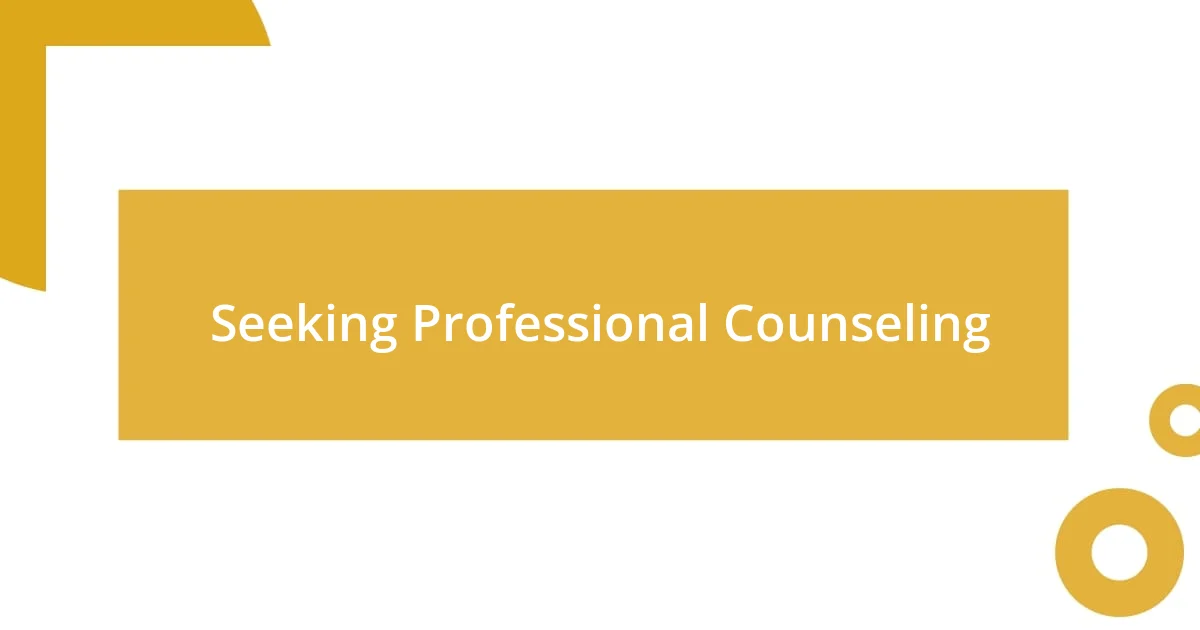
Seeking Professional Counseling
Seeking professional counseling was an essential step in my journey through infertility. I remember sitting in that initial session, feeling vulnerable yet hopeful. The counselor’s warm demeanor made it easier for me to open up about my fears and frustrations. I found it incredibly beneficial to talk to someone trained to understand the emotional complexities of infertility. It felt reassuring to express feelings that I often kept bottled up, and I realized that venting was just the first step toward healing.
Counseling also offered practical strategies to cope with the rollercoaster of emotions. I learned mindfulness techniques that helped ground me during particularly challenging times. There were moments when I felt hopeless, but having someone to guide me through those feelings was a lifeline. I would leave each session feeling lighter, equipped with tools to manage anxiety and sadness. It’s fascinating how talking through your feelings can illuminate new perspectives, don’t you think?
I vividly recall one particular session when I shared the intense pressure I felt from family to conceive. My counselor helped me articulate this feeling, which somehow diminished its power. In that moment, I realized that it was okay to prioritize my mental health over societal expectations. Professional counseling gave me the space to explore my emotions fully, a vital part of my healing process during this difficult chapter.
| Aspect | Personal Experience |
|---|---|
| Initial Feelings | Vulnerable but hopeful, wondering what to expect. |
| Coping Strategies | Learned mindfulness and grounding techniques. |
| Family Pressure | Realized the importance of prioritizing mental health over external expectations. |
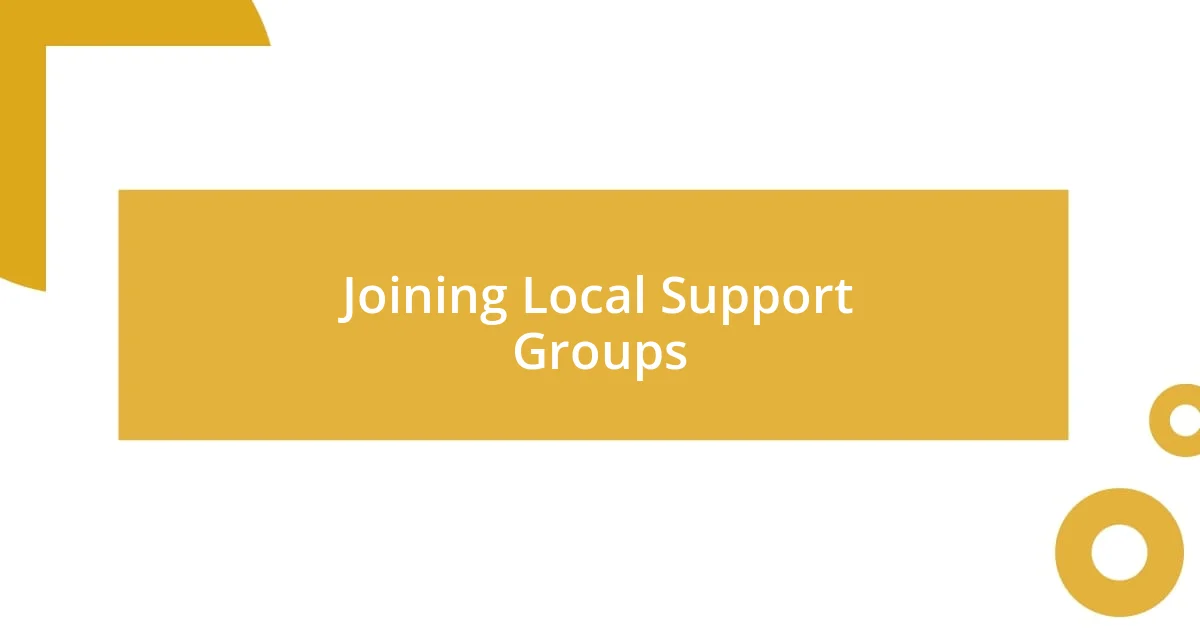
Joining Local Support Groups
Joining local support groups became a lifeline for me during my infertility journey. I remember walking into that first meeting, my heart racing and my palms sweaty. But as I sat in a circle with others who had shared similar pain, the atmosphere transformed from tense to comforting. It was an incredible realization to hear their stories; it made me feel like I was part of a community rather than an isolated struggle. Does that sense of belonging resonate with you?
One thing I appreciated about these groups was the diverse range of experiences shared. Some members were in the early stages of trying to conceive, while others were navigating through multiple rounds of treatments. This allowed me to glean advice and coping strategies I hadn’t considered before. During one session, a woman recounted how she dealt with friends’ pregnancy announcements. I could relate deeply and found myself taking notes on her tips. Have you ever found learning from others’ experiences to be particularly enlightening?
Attending these local meetups also opened up discussions about topics often deemed taboo. I recall breaking down in tears when someone bravely shared their own losses. It felt validated and safe to express my emotions without judgment; genuinely connecting with others was therapeutic. We shared laughter and tears, building a camaraderie that helped ease the burdens we each carried in our hearts. Isn’t it amazing how a shared experience can create such a powerful bond?
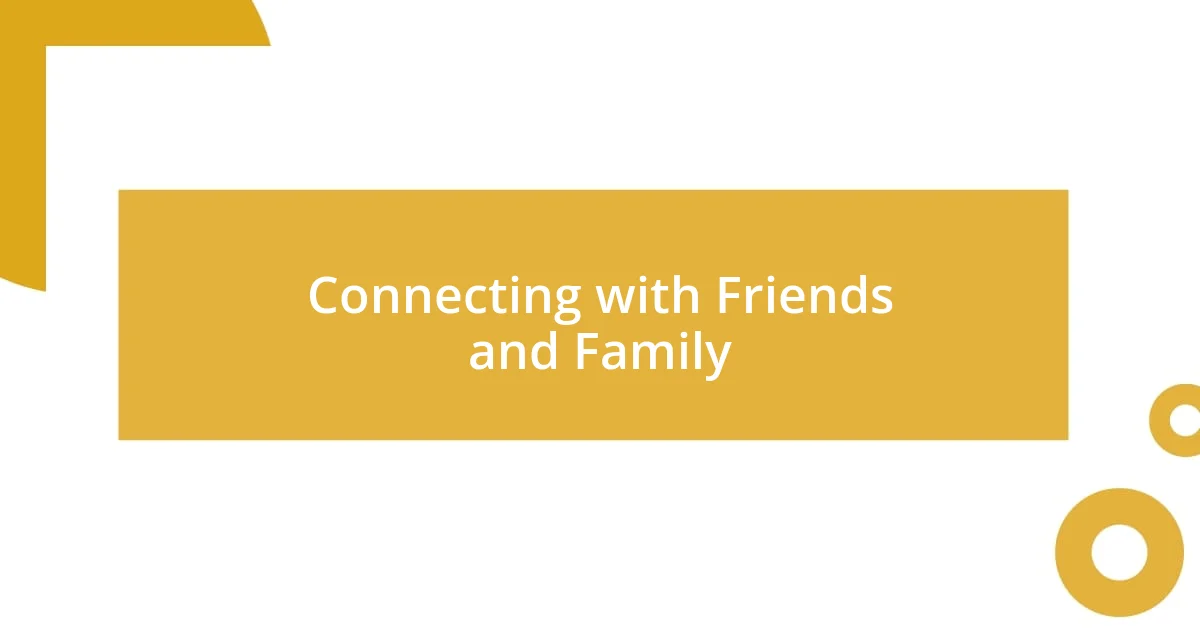
Connecting with Friends and Family
Connecting with friends and family proved to be crucial for me during the emotionally tumultuous period of infertility. I distinctly remember reaching out to my best friend after one particularly heart-wrenching appointment. You know that feeling when you’re holding back tears, but all you need is an understanding ear? My friend was there, ready to listen without judgment. It was refreshing to share my worries with someone who cared deeply and could offer comfort just by being present.
Opening up to family took a little more thought. I hesitated, fearing they might react with pity or unsolicited advice. But one day, while preparing dinner, I decided to casually mention my struggles to my mom. To my surprise, she opened up about her own challenges with pregnancy. That moment strengthened our bond and made me realize that vulnerability often fosters intimacy. Isn’t it interesting how sharing our burdens can create connections we didn’t realize were there?
I also found new ways to engage with loved ones, turning painful moments into opportunities for deeper discussions. During a family gathering, when everyone was sharing updates about their kids, I found myself taking a deep breath. Instead of retreating into silence, I talked about my hopes and fears. The support that flooded in afterward was overwhelming. I felt an immense relief knowing that opening up could also pave the way for support and understanding that I desperately needed. Have you ever felt the weight of silence lift when you finally share what you’re going through?
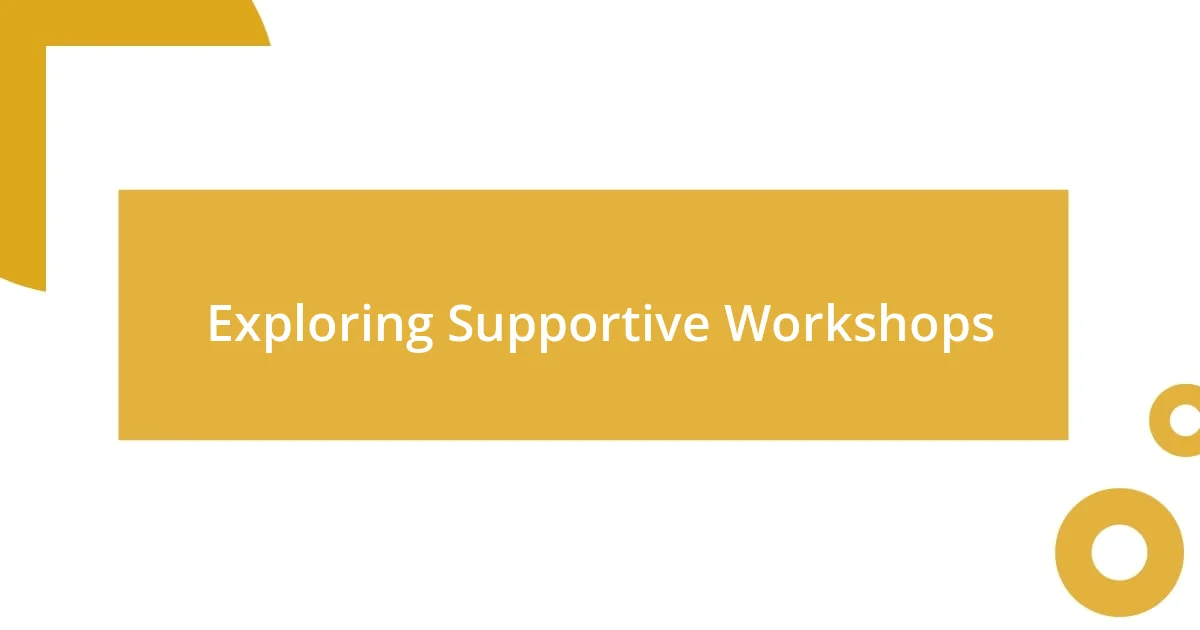
Exploring Supportive Workshops
Exploring workshops focused on infertility support was eye-opening for me. I remember walking into my first workshop, a bit skeptical but desperate for connection. The diversity of participants made me feel that this space was truly inclusive—women from different walks of life, each carrying their unique stories yet sharing in the same heartache. Have you ever felt that blend of curiosity and apprehension in a new environment?
One of the most impactful aspects of these workshops was the hands-on activities that encouraged candid conversations. I participated in a guided journaling session aimed at expressing emotions I hadn’t even acknowledged. As I wrote, tears streamed down my face, but I also felt an exhilarating release. It was as if I was peeling back layers of pain, uncovering thoughts I had buried deep. Doesn’t it feel liberating to unearth feelings that have lingered in the shadows?
I also cherished the creative workshops that incorporated art as a healing tool. I vividly recall a painting session where we each designed a canvas to represent our journey. As my brush stroked the canvas, I let go of pent-up frustration and transformed it into a vibrant expression of hope. The atmosphere buzzed with creativity, and I felt connected not only to my art but also to the women around me—each one a testament to resilience. Can you relate to the power of creativity as a form of emotional release?
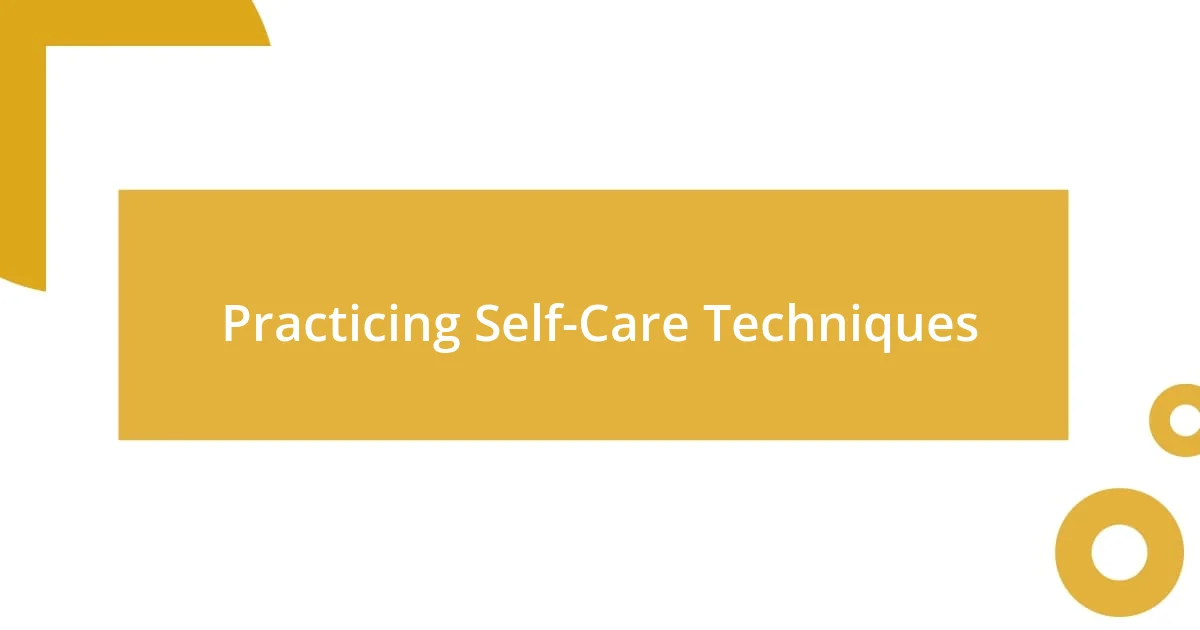
Practicing Self-Care Techniques
Practicing self-care during infertility was essential for my mental and emotional well-being. I found that taking time for small, meaningful rituals made a difference. Every morning, I dedicated a few moments to sip herbal tea while sitting quietly in my garden. It was my little oasis, a space to breathe and gather myself before the day unfolded. Have you ever noticed how a simple pause can shift your entire mindset?
One technique that truly helped me was incorporating mindfulness and meditation into my routine. I remember downloading a meditation app and committing to just five minutes a day. At first, it felt awkward, like my mind was racing in a hundred directions. But gradually, I found solace in focusing on my breath. This practice allowed me to create a refuge from the relentless cycle of appointments and anxieties. Doesn’t it feel comforting to find a moment of tranquility amid chaos?
I also embraced physical activities that brought joy rather than pressure. Joining a yoga class specifically designed for those experiencing fertility challenges was transformative. I can still recall the sense of community as we moved through poses, sharing our collective strength while nurturing our bodies. It was more than just exercise—it became a space to honor our journeys in a gentle and supportive environment. Have you ever experienced the invigorating power of movement as a means of healing?









